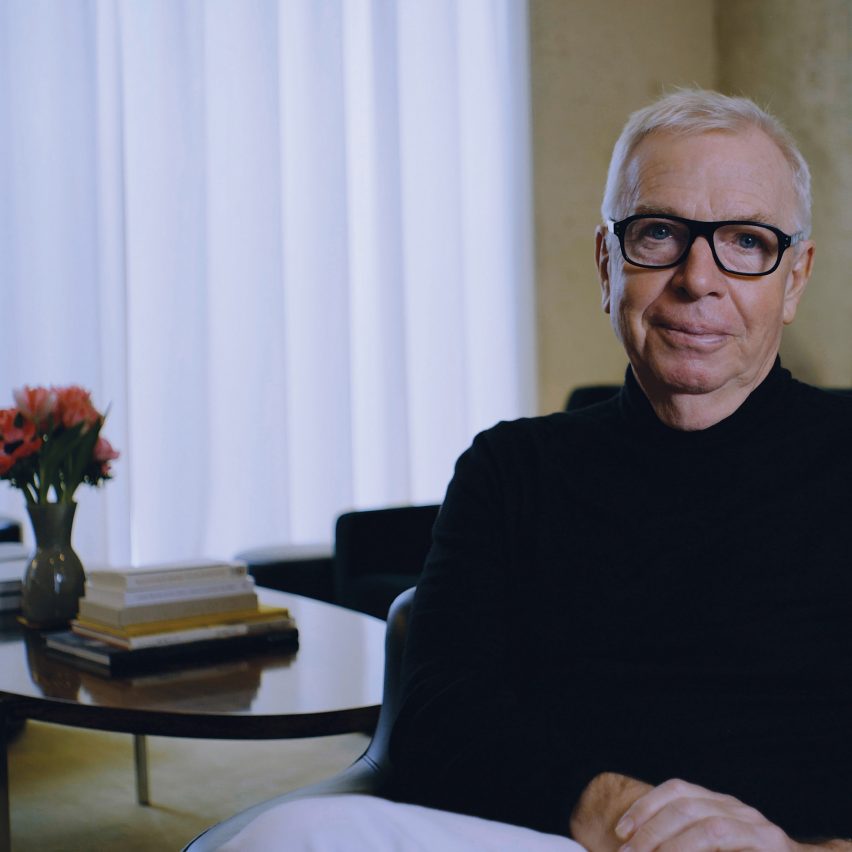
In this interview, British architect David Chipperfield, who was named the winner of the Pritzker Architecture Prize today, explains how he believes his determination made up for a lack of natural talent.
Speaking to Dezeen as part of our Face to Face podcast series, which was originally published in 2020, Chipperfield told Dezeen’s late founder and editor-in-chief Marcus Fairs that he sometimes feels “like a bit of a fake”.
“Determination and commitment can compensate for a talent,” he said. “This is a discussion I have with my wife a lot, I don’t believe I’m that talented as an architect, probably just more persevering.”
Chipperfield explained that, despite completing numerous award-winning buildings all around the world, he still suffers from imposter syndrome, claiming that he feels like “a sham” compared to some of his contemporaries.
“I’m not a talented figure like Renzo”
“I still feel like a sham – I still feel like I’ve cobbled together something that aspires to being a grown-up architect,” he said.
“You go to Renzo [Piano]‘s office and I was impressed and depressed at the same time – because you think this is a real grown-up office and I’ve had to cobble it together, I guess.”
“I’m not a talented figure like Renzo – I’m a good catalyst, I think I am a good provoker, I am a good strategist – I have a sense of purpose but I don’t have innate creative talents to the level of someone like Renzo or maybe Frank Gehry or Álvaro Siza,” he continued. “So in that sense, I feel a bit of a fake.”
Chipperfield now joins Gehry, Siza and Piano – who respectively won the award in 1989, 1992 and 1998 – as a winner of the Pritzker Architecture Prize.
He is the fifth British architect to win architecture’s most prestigious award following James Stirling in 1981, Norman Foster in 1999, Zaha Hadid in 2004 and Richard Rogers in 2007.
“I would have failed” without Zaha
In the interview, Chipperfield explained how he studied with Hadid at the Architecture Association in London and she helped him pass the course.
“Zaha, until her dying days, reminded me that if it hadn’t been for her, I would have failed and that she got me my diploma,” he recalled.
He went on to work at both Foster and Rogers’ studios before establishing his own practice in the mid-1980s, despite not being taken by the high-tech style that was being pioneered in their offices.
“I wasn’t particularly interested in high-tech, funnily enough,” he said. “Although I had the opportunity to go to Paris and see the Centre Pompidou during construction with Richard and I thought that was just the sexiest building I’d ever seen.”
Chipperfield was awarded the RIBA Royal Gold Medal in 2010 and the Praemium Imperiale in 2013. In 2020 he was added to the elite Order of the Companions of Honour – one of the highest awards available to a British citizen.
He runs one of the world’s most successful studios with offices in the UK, Germany, Italy and China. His studio has completed numerous high-profile buildings including the Museum of Modern Literature in Marbach, Germany, which won the Stirling Prize in 2007.
Other key projects include the Neues Museum, Ernsting’s Service Centre, Folkwang Museum – all in Germany, America’s Cup Building in Spain and The Hepworth Wakefield and River and Rowing Museums in the UK – all of which were shortlisted for the Stirling Prize.
Listen to the full podcast below.
The post "I don't believe I'm that talented" says Pritzker winner David Chipperfield appeared first on Dezeen.
